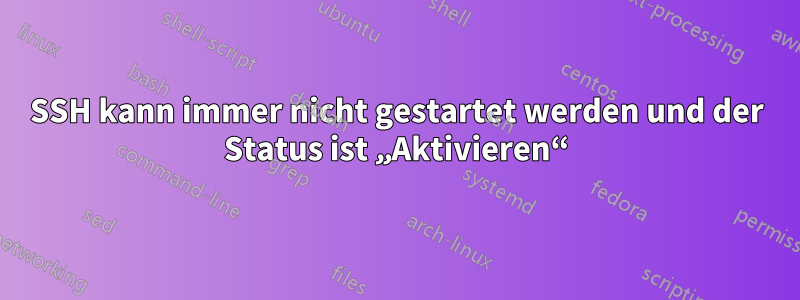
Ich verwende open-ssh 7.8p1 auf Redhat 7.0. Ich habe das Paket heruntergeladen und die folgenden Befehle ausgeführt, um das Paket zu installieren:
./configure --prefix=/usr --sysconfdir=/etc/ssh --with-privsep-path=/var/lib/sshd --with-pam --with-xauth=/usr/bin/xauth
machen
sudo make installieren
sshd/konfiguration:
#AddressFamily any
#ListenAddress 0.0.0.0
#ListenAddress ::
HostKey /etc/ssh/ssh_host_rsa_key
#HostKey /etc/ssh/ssh_host_dsa_key
HostKey /etc/ssh/ssh_host_ecdsa_key
HostKey /etc/ssh/ssh_host_ed25519_key
# Ciphers and keying
#RekeyLimit default none
# Logging
#SyslogFacility AUTH
SyslogFacility AUTHPRIV
#LogLevel INFO
# Authentication:
#LoginGraceTime 2m
#PermitRootLogin yes
#StrictModes yes
#MaxAuthTries 6
#MaxSessions 10
#PubkeyAuthentication yes
# The default is to check both .ssh/authorized_keys and .ssh/authorized_keys2
# but this is overridden so installations will only check .ssh/authorized_keys
AuthorizedKeysFile .ssh/authorized_keys
#AuthorizedPrincipalsFile none
#AuthorizedKeysCommand none
#AuthorizedKeysCommandUser nobody
# For this to work you will also need host keys in /etc/ssh/ssh_known_hosts
#HostbasedAuthentication no
# Change to yes if you don't trust ~/.ssh/known_hosts for
# HostbasedAuthentication
#IgnoreUserKnownHosts no
# Don't read the user's ~/.rhosts and ~/.shosts files
#IgnoreRhosts yes
# To disable tunneled clear text passwords, change to no here!
#PasswordAuthentication yes
#PermitEmptyPasswords no
PasswordAuthentication yes
# Change to no to disable s/key passwords
#ChallengeResponseAuthentication yes
ChallengeResponseAuthentication no
# Kerberos options
#KerberosAuthentication no
#KerberosOrLocalPasswd yes
#KerberosTicketCleanup yes
#KerberosGetAFSToken no
#KerberosUseKuserok yes
# GSSAPI options
#GSSAPIAuthentication yes
#GSSAPICleanupCredentials no
#GSSAPIStrictAcceptorCheck yes
#GSSAPIKeyExchange no
#GSSAPIEnablek5users no
# Set this to 'yes' to enable PAM authentication, account processing,
# and session processing. If this is enabled, PAM authentication will
# be allowed through the ChallengeResponseAuthentication and
# PasswordAuthentication. Depending on your PAM configuration,
# PAM authentication via ChallengeResponseAuthentication may bypass
# the setting of "PermitRootLogin without-password".
# If you just want the PAM account and session checks to run without
# PAM authentication, then enable this but set PasswordAuthentication
# and ChallengeResponseAuthentication to 'no'.
# WARNING: 'UsePAM no' is not supported in Red Hat Enterprise Linux and may cause several
# problems.
UsePAM yes
#AllowAgentForwarding yes
#AllowTcpForwarding yes
#GatewayPorts no
X11Forwarding yes
#X11DisplayOffset 10
#X11UseLocalhost yes
#PermitTTY yes
#PrintMotd yes
#PrintLastLog yes
#TCPKeepAlive yes
#UseLogin no
#UsePrivilegeSeparation sandbox
#PermitUserEnvironment no
#Compression delayed
ClientAliveInterval 20m
#ClientAliveCountMax 3
#ShowPatchLevel no
#UseDNS yes
#PidFile /var/run/sshd.pid
#MaxStartups 10:30:100
#PermitTunnel no
#ChrootDirectory none
#VersionAddendum none
# no default banner path
#Banner none
# Accept locale-related environment variables
AcceptEnv LANG LC_CTYPE LC_NUMERIC LC_TIME LC_COLLATE LC_MONETARY LC_MESSAGES
AcceptEnv LC_PAPER LC_NAME LC_ADDRESS LC_TELEPHONE LC_MEASUREMENT
AcceptEnv LC_IDENTIFICATION LC_ALL LANGUAGE
AcceptEnv XMODIFIERS
# override default of no subsystems
Subsystem sftp /usr/libexec/openssh/sftp-server
# Example of overriding settings on a per-user basis
#Match User anoncvs
# X11Forwarding no
# AllowTcpForwarding no
# PermitTTY no
# ForceCommand cvs server
Ergebnis im SSH-Debugmodus:
debug2: load_server_config: done config len = 669
debug2: parse_server_config: config /etc/ssh/sshd_config len 669
debug3: /etc/ssh/sshd_config:22 setting HostKey /etc/ssh/ssh_host_rsa_key
debug3: /etc/ssh/sshd_config:24 setting HostKey /etc/ssh/ssh_host_ecdsa_key
debug3: /etc/ssh/sshd_config:25 setting HostKey /etc/ssh/ssh_host_ed25519_key
debug3: /etc/ssh/sshd_config:32 setting SyslogFacility AUTHPRIV
debug3: /etc/ssh/sshd_config:47 setting AuthorizedKeysFile .ssh/authorized_keys
debug3: /etc/ssh/sshd_config:65 setting PasswordAuthentication yes
debug3: /etc/ssh/sshd_config:69 setting ChallengeResponseAuthentication no
debug3: /etc/ssh/sshd_config:96 setting UsePAM yes
debug3: /etc/ssh/sshd_config:101 setting X11Forwarding yes
debug3: /etc/ssh/sshd_config:112 setting ClientAliveInterval 20m
debug3: /etc/ssh/sshd_config:126 setting AcceptEnv LANG LC_CTYPE LC_NUMERIC LC_TIME LC_COLLATE LC_MONETARY LC_MESSAGES
debug3: /etc/ssh/sshd_config:127 setting AcceptEnv LC_PAPER LC_NAME LC_ADDRESS LC_TELEPHONE LC_MEASUREMENT
debug3: /etc/ssh/sshd_config:128 setting AcceptEnv LC_IDENTIFICATION LC_ALL LANGUAGE
debug3: /etc/ssh/sshd_config:129 setting AcceptEnv XMODIFIERS
debug3: /etc/ssh/sshd_config:132 setting Subsystem sftp /usr/libexec/openssh/sftp-server
debug1: sshd version OpenSSH_7.8, OpenSSL 1.0.2k-fips 26 Jan 2017
debug1: private host key #0: ssh-rsa SHA256:Gd4H0gToGhergccDgoCrmH03UPAfWcUd1NKusBGlls4
debug1: private host key #1: ecdsa-sha2-nistp256 SHA256:NxfjZIJ7oRPjfsBJKeSw/N3kf4iZMedZFnjePbLbyoc
debug1: private host key #2: ssh-ed25519 SHA256:CWwG5eZVSaU3hSizraB1blaeYfws4KI6NOWn1I8KC9Y
debug1: rexec_argv[0]='/usr/sbin/sshd'
debug1: rexec_argv[1]='-ddd'
debug3: oom_adjust_setup
debug1: Set /proc/self/oom_score_adj from 0 to -1000
debug2: fd 3 setting O_NONBLOCK
debug1: Bind to port 22 on 0.0.0.0.
Server listening on 0.0.0.0 port 22.
debug2: fd 4 setting O_NONBLOCK
debug3: sock_set_v6only: set socket 4 IPV6_V6ONLY
debug1: Bind to port 22 on ::.
Server listening on :: port 22.
Ich versuche, das Problem herauszufinden, und habe versucht, SSHD im Debugmodus auszuführen, und es wurde kein Fehler angezeigt. Nach 1 Minute schlägt der SSHD-Dienst fehl und startet dann automatisch neu.
Ich kann mich beim Server anmelden, aber wenn dies fehlschlägt und bevor ich erneut starte, wird mir die Meldung „Verbindung abgelehnt“ angezeigt.
Kann also jemand bitte eine Lösung für dieses Problem vorschlagen?
Antwort1
Ich habe herausgefunden, was fehlte und warum der Dienst nicht über systemd gestartet werden konnte. Der SSH-Dienst wurde erfolgreich kompiliert, kann aber nicht so eingestellt werden, dass er über systemd gestartet wird. Also habe ich das Paket von heruntergeladen http://www.linuxfromscratch.org/blfs/downloads/svn/blfs-systemd-units-20180105.tar.bz2, den Inhalt extrahiert und sudo make install-sshd ausgeführt.
Danach konnte ich den Dienst über sudo systemctl start sshd.service starten, der Status war aktiv (läuft).


